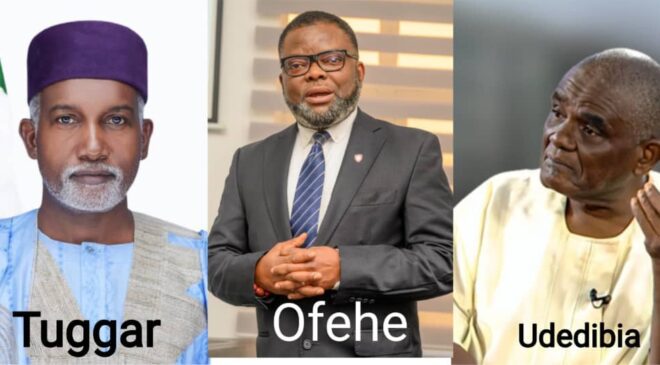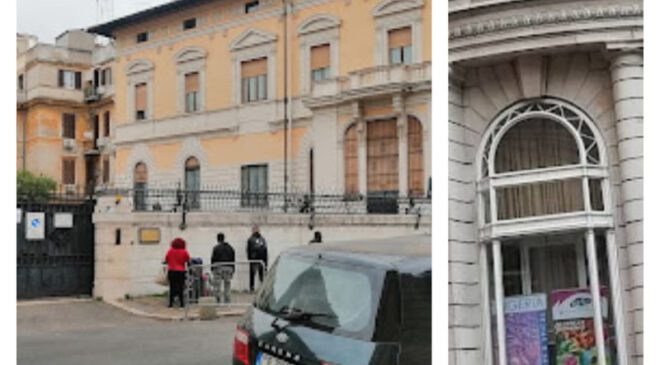
ABUJA/Nigeria: Nigeria’s embassies and consulates, once symbols of national pride and diplomacy,are now shadows of themselves. From unpaid rents that embarrass the country before host governments to stranded citizens unable to access basic consular services, the rot in Nigeria’s foreign missions is no longer hidden.
For two years, many of these missions have been without substantive ambassadors or consuls, raising serious questions about the government’s commitment to international diplomacy.
Nigeria has operated without substantive ambassadors and consuls in several foreign missions, leaving diplomatic representation in limbo and citizens abroad facing growing frustrations.
In a recent interview granted Channels Television and monitored by this reporter, Netherlands-based environmental rights activist and Chief Executive Officer, Hope for Niger Delta Campaign (HNDC), Comrade Sunny Ofehe, called for a forensic audit of the Ministry of Foreign Affairs. His call, made during the talkshow, is reigniting scrutiny of how Nigeria manages billions of naira allocated to its diplomatic service each year.
Ofehe, a foreign relations analyst, raised the alarm over the dire state of Nigeria’s diplomatic missions worldwide, citing years of neglect, inadequate funding, and logistical challenges.
The analyst, who has maintained relationships with Nigeria’s foreign missions for over 20 years and recently visited five embassies across continents, including Beijing, Cairo, and European Union countries—expressed disappointment over the persistent issues. “It is a shame that our foreign missions are going through this. We’ve had protracted problems for years, and it’s only getting worse,” he lamented.
“We cannot continue with this culture of silence,” Ofehe declared, adding; “Nigerians abroad are humiliated daily because our embassies lack leadership, lack funds, and lack accountability. A forensic audit is the only way to expose how our missions became this dysfunctional.”
Speaking further, he detailed the struggles faced by diplomatic staff, noting that some embassy workers have had to withdraw their children from school due to unpaid fees, and several missions are threatened with power outages because they cannot settle utility bills. “Today, everyone does everything by themselves—microwave, refrigerator, even water supplies. It’s a crisis that needs urgent addressing,” he emphasized.
Reports from Nigerians abroad paint a disturbing picture: staff salaries left unpaid for months, landlords threatening to evict embassies, and critical services delayed due to lack of basic funds. In some cases, local staff, who are the face of Nigeria’s diplomatic offices—have resorted to protests.
These failures not only inconvenience citizens but also damage Nigeria’s reputation on the global stage. Diplomats, analysts warn, cannot effectively represent the country when their offices struggle to keep the lights on.
Ofehe said that the foreign missions were in a “worrisome state” and demanded urgent intervention. “We cannot continue to watch our foreign missions deteriorate under poor funding, lack of leadership and absence of accountability”.
He highlighted the impact of these challenges on Nigeria’s global diplomatic standing. “Without the Ministry of Foreign Affairs functioning properly, Nigeria cannot project the image it needs internationally. Our missions are supposed to be the face of our country,” he said.
“I have been very concerned. Under the Vienna convention of diplomatic relations you have what is called diplomatic reciprocity. What that simply means is that in a country where you don’t have an ambassador, an ambassador has to relate with a head of state or the president or prime minister or that country or at the very least at the ministerial level.

“In a country where you don’t have an ambassador and you have head of mission who happens to be a civil servants at the level 14, or 17, there is a limit to what they can relate with. Now last year the president was in Paris where he carried the who is who in the business sector to sign bilateral and multilateral treaties and agreement.
“We just saw what happened in Brazil where they signed different agreements including those for aviation and also he went to Japan. These are countries where Nigeria don’t have Ambassadors. The signing process is not really the core part of the deal. It is what happened afterwards that’s the core part of the deal. Who does the follow up when all these are done?. On what you just said about the missions, I think is there have to be forensic audit of the ministry itself”.
He pointed out that Nigeria’s diplomatic infrastructure is outdated, with some embassies operating in dilapidated conditions, such as the embassy in Rome with an “eyesore” residence, and the embassy in Freetown in need of urgent repairs. “This is a crisis that calls for presidential intervention,” he insisted.
On the issue of ambassadorial appointments, he revealed that Nigeria has delayed filling key diplomatic posts due to financial constraints. “Last year, the president was in Paris, Japan, and Brazil, signing agreements, but Nigeria does not have ambassadors in these countries to follow up on those deals,” he noted. “The signing is just the beginning; the real work begins afterward, and someone needs to carry that out.”
He also criticized the current approach to embassy funding, suggesting that Nigeria should prioritize “Group A” missions—such as those in the United States, France, and the United Nations headquarters—where diplomatic engagement is most crucial. “We need to have ambassadors in these strategic locations,” he stressed.
Proffering solution, he said; “What should be done is that even if we don’t have the financial means to cover all of our about 110 embassies across the world there is what they call the group A embassy. You just left Brazil. There should an Ambassador in Brazil. There should be an Ambassador in France. We have the United Nations General Assembly (UNGA) coming up very soon. We don’t have an ambassador representation in New York. We do not have an ambassador representation in Washington DC. I just came from Washington DC.
“Most of our embassy are like ghost town. I watched a video few days ago where the Minister of Foreign Affairs was taking about global support for a candidate that Nigeria want to present for international criminal court in the Hague. And then of course, we are also presenting a candidate who was a former ambassador here for the Organization for the Prohibition of Chemical Weapons (OPCW-Dublin). Can the Minister looby for them from Abuja? The answer is no. Who is going to carry out those diplomatic engagement with their colleagues to ensure that we have a voice at the table on the global level? This is what we should be taking about”, he asserted.
Ofehe called for a forensic audit of the Ministry of Foreign Affairs to uncover and address systemic issues. “There’s a bill of about $1 billion to appoint ambassadors across all missions—money Nigeria, struggling with foreign exchange, cannot afford,” he explained.
“I was told that the reason the president is refusing to appoint ambassadors at this time; I don’t know if my figures are correct, he was presented with a bill of about $1 Billion dollars to appoint and post ambassadors to all the missions. Now that is a huge amount of money for a country that’s still struggling for foreign exchange and then you have to talk about their upkeep on a monthly bases”.
He said that the call for forensic audit was not to witch-hunt but necessary to uncover how allocations to the Ministry of Foreign Affairs are managed, and why missions abroad are unable to carry out basic functions.
Ofehe’s concerns mirror the frustrations of many Nigerians in the diaspora who often complain about poor consular services, unpaid staff at embassies, and embarrassing reports of Nigerian missions being threatened with eviction over unpaid rents.
While the Ministry insists it is stabilising missions, critics like Ofehe say the crisis is deeper than just budgetary shortfalls. For them, the lack of appointed ambassadors for two years and the opaque handling of allocations point to systemic neglect and mismanagement.
“If funds are truly being released, why are embassies still crippled? Where is the money going?” Ofehe asked pointedly.
Former acting Permanent Secretary at the Ministry of Foreign Affairs, Chuka Udedibia, shared same views but called for better funding for Nigerian missions abroad, adding that such allocations should reflect the prevailing exchange rate between the naira and the dollar.
He highlighted financial and structural constraints as the major challenges facing Nigeria’s foreign missions.
According to him, without sustainable reforms, the same problems will persist.
Speaking during the programme, Udedibia said the foreign missions’ challenges were rooted in chronic underfunding, exchange rate volatility, and heavy dependence on rental properties abroad.
“I would prefer not to dwell on the symptoms and talk of the causes. About 10 years ago, the official rate of ₦1 to $1 was about ₦150. Today, it’s about ₦1,500; at one point, it was even about ₦1,800.
“For missions to survive, remittances to the missions must reflect the shortfall they suffer from the fall of the naira to major international currencies, but it does not happen. That was where the problem started.
“Throughout this period, what you notice is a cumulative shortfall in remittances to missions and more debts. The ministry itself is a victim,” he explained.
The former envoy stated that while intervention measures had been taken before, the relief was often temporary.
“They have done some special intervention efforts, but don’t be surprised if in the next six months to one year, we are battling the same problem again,” he added.
Udedibia also decried Nigeria’s slow pace in acquiring permanent properties for missions abroad as a major cost driver.
“In missions where we own the chancery and quarters, expenditure is not much. But in others, we pay rent on both offices and officers’ residences, and it is very expensive,” he said.
In his response, Ofehe commended Ambassador Chuka Udedibia for his contribution to the discourse and emphasized the need for oversight by Nigeria’s National Assembly. “Oversight is crucial to ensure accountability and proper management of our diplomatic assets,” he said.
“Like what he said the National Assembly, the Committee saddled with those responsibilities to carry out oversight function on the Ministry and how they also operate are part of the problem. What should be done? I think this is a crisis and it calls for presidential intervention particularly when you have had successive Presidents who wants to engage the international community so there have to be some form of interventions”.
